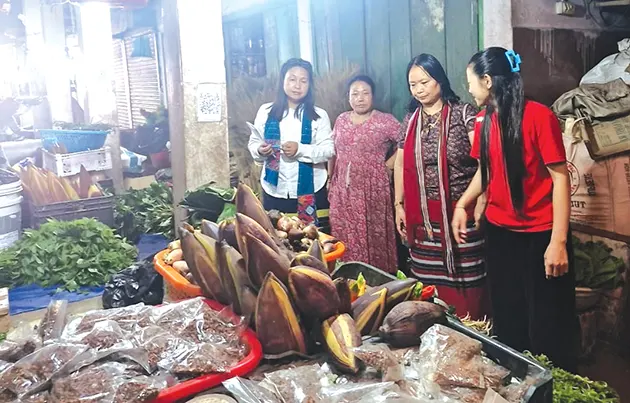ITANAGAR, 9 Apr: The Arunachal Pradesh Women’s Welfare Society (APWWS) has appealed to the state government to conduct a thorough inquiry into the illegal and arbitrary seizure of traditional leafy vegetables and food items being sold by daily wage earners and vegetable vendors in Gandhi Market in Itanagar on Tuesday.
Strongly condemning the incident of seizure of traditional leafy vegetables and food items consumed by tribal communities for generations, the APWWS on Wednesday also demanded appropriate compensation for the affected vendors and appropriate action against the officials involved in seizure of the traditional food items.
The APWWS in a statement said that, following reports circulating on social media platforms, APWWS members personally met the affected women vendors in Gandhi Market on Wednesday to verify the situation.
“According to vendor testimonies, approximately six officers arrived at the market between 1-1:30 PM on Tuesday, and confiscated traditional food items including honyor, banana flower (locally known as papuk, hoji, joka, marseng, and poto), wild mushrooms, bamboo shoots, tanam and tase and dried king chilli packets and brooms,” the APWWS said.
It said that the seizure has resulted in immediate loss of livelihood for the women vendors who are often the sole breadwinners of their families, in addition to economic loss through wastage of perishable goods that represent their limited investment capital, and psychological trauma.
The APWWS further said that the unannounced raid violated the established forest rights of the tribal communities of Arunachal Pradesh to harvest and sell non-timber forest produce under the Scheduled Tribes and Other Traditional Forest Dwellers (Recognition of Forest Rights) Act, 2006.
The women’s body said that there was lack of transparency as there was no proper documentation, including seizure warrants or memos, provided to the affected women, and there was absence of due process as no prior notices were served to the vendors before the sudden seizure.
It further said that “the action appears discriminatory and fails to recognise the cultural significance and sustainable nature of traditional harvesting practices.”
“Such arbitrary actions, attacking tribal food sovereignty in the name of forest protection undermine our cultural heritage and require immediate redress,” the APWWS said, and added that it is also writing a representation to the chief secretary in this regard.




